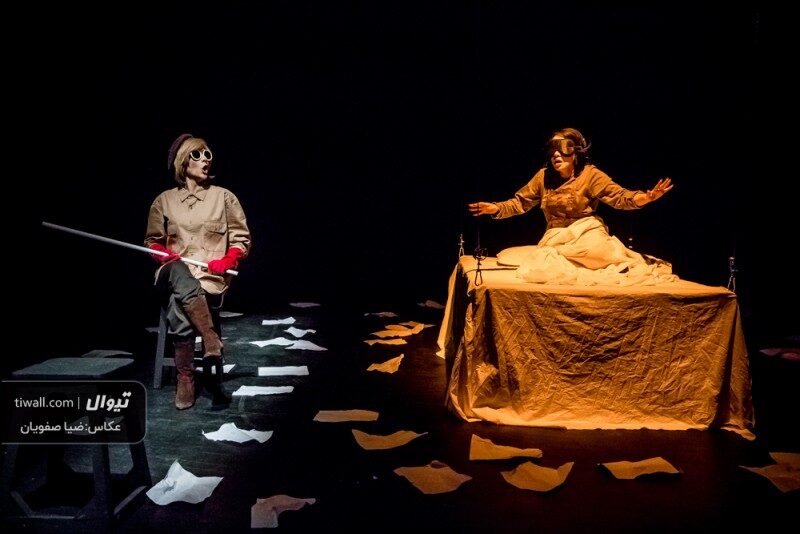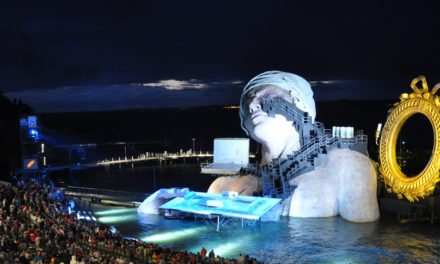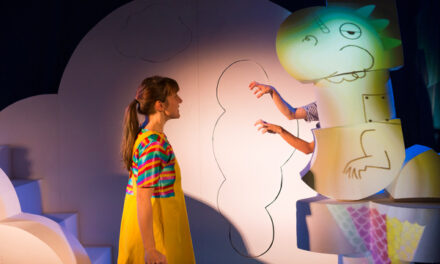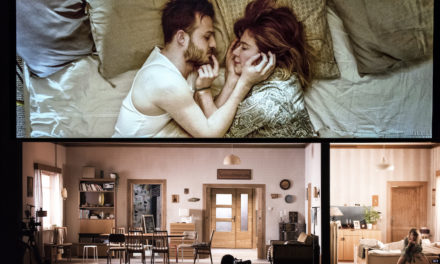The 39th Fadjr International Theater Festival celebrated a wide range of performances, from staged plays and street performances to radio plays and television plays (Teletheater), over ten days, from January 30 to February 10. The festival met with a considerable number of participants, which indicated a ray of hope for Iran’s theater struggling with recession and closure during COVID-19. The festival was fully in compliance with health protocols, including social distancing, disinfecting theaters, and reducing seating capacity.
The festival was organized by the Iran Performing Arts Center and overseen by the Ministry of Culture and Islamic Guidance, and divided into non-competitive and competitive sections. There was a total of 107 plays from 22 Iranian provinces performed in the competitive section, which included the categories of Stage Plays, Street Theater, Radio Theater, Television Plays, Alternative Performances, and Playwriting. The International Competition Section was not held this year due to a spike in coronavirus cases around the world.
Of the 107 works, 49 plays were from the Tehran Province and 58 were from other provinces of Iran. Forty-eight productions participated in the competitive Stage Play section, which was performed at 10 theater venues. Twenty-six of these were from the capital. Thirty-nine plays were performed in the competitive Street Theater section, while Radio Theater was one of the festival’s main competitive sections due to the coronavirus outbreak by featuring ten radio plays. Media coverage of stage plays, theater photography, and posters were other subsidiary categories of the festival’s competition section. To accompany the festival, documents related to 40 years of Iran’s contemporary theater performance and research were displayed virtually on the festival website and Instagram account.
The festival created a new category in the competitive section, named Soldier of Revolution to commemorate the army General Qāssem Soliemāni, who was killed in an attack by the US forces in January 2020. The category focused on resistance theater and war. The winner of this category, Soldier, was a play about the life of General Soliemāni written and directed by Hossein Pārsāei. It was performed five times during the festival.
The statistics released by the secretariat of Fadjr Festival indicated the average age of the directors that participated was 37 and ranged from 20 to 70 years old. About 88% of the directors had an academic education in theater. Isfahan Province had the highest number of participating plays in the festival after Tehran. Meanwhile, the Competitive Stage Play section had only accepted two female writers and two female directors; this was the lowest number of women in this section over the thirty years of the festival’s history. This meant that of the 50 playwrights competing in the festival, 48 were men and only 2 were women, and in directing, of the 49 only 2 were women. This included woman director and playwright Leyli Aaj with her play, Ebrāhim Where Are You?, the director of Heaven Hakimullah, Vidā Mousavi, and the playwright Sepideh Ghorbāni for Up. Art. Maan (The Apartment).
The festival provided a limited number of tickets for sale due to health and safety restrictions limiting audiences to between 30% and 50% seating capacity. However, theater fans had the chance to watch the performances in the competition section of the festival online. The plays had many views, as well as other theater films featuring on three websites: Tiwall, Namāyeshnet, and Iran tv. theater. These websites are continuing to offer theater films and showcasing other upcoming national theater festivals.
The play Rat Race, written by the acclaimed playwright Mohammad Charmshir and directed by Abbās Ghaffāriwon, won awards for Best Playwriting, Best Actress (Ayeh Kiānpour), Best Actor (Sourosh Tāheri), and Best Make-up (Sara Eskandari). The play is about the ordeal of a young Iranian girl seeking to make a better life by traveling to Europe, and her nightmares as a refugee. The jury prize for the Best Stage Direction went to writer and director Shahrām Gilābādi for the play One Minute And Thirteen Seconds, a field report about homeless women living in cardboard boxes, performed by three actresses. The play’s subject was previously featured on a bigger scale by Sānāz Bayān in the acclaimed, award-winning stage play Shelter in 2017.
Other notable award winners were from the provincial theaters. The play Bob Bara, an experimental piece made during lockdown, narrated the living experiences of thirty individuals. The play won the grand prize for Best Play and an honorary diploma for the young Kurdish director from Sanandaj County, Neema Imanzadeh. Another winning play was Epidemic, directed by Reza Pourtorābzādeh from Golestān Province. It is a comedy about a young man that discovers an element that prevents lying and social deceptions. The harmonized, collaborative performance won the jury’s Special Prize and Best Lighting Design. Pinocchio was another play with a similar theme of lies and their effects on normal life. The play’s writer and director Ousān Mahmoudi received the Certificate of Appreciation for this story of two teenage girls and the fine line between their imaginations and reality, and how this relates to those who lie for their own benefit.
The most dominant subjects were social issues, and performers from other provinces had a chance to showcase their talents in the capital during a time when theaters are challenged by COVID-19. Utilizing virtual platforms, streaming performances was a new measure taken by the organizers to adapt to the pandemic. This streaming continues after the festival and is currently being used by theater performers to engage audiences outside theaters, which currently have a limited number of shows and spectators.
This post was written by the author in their personal capacity.The opinions expressed in this article are the author’s own and do not reflect the view of The Theatre Times, their staff or collaborators.
This post was written by Niloofar Mohtadi.
The views expressed here belong to the author and do not necessarily reflect our views and opinions.


















